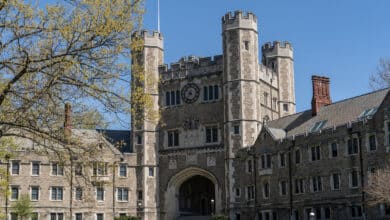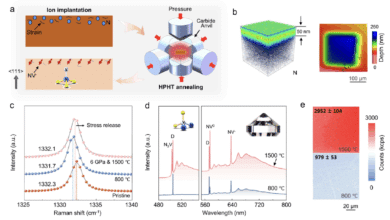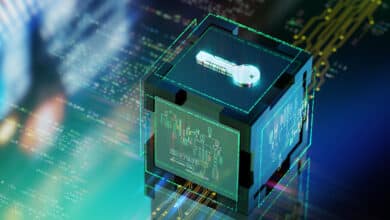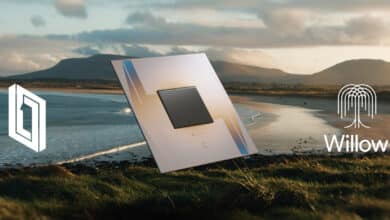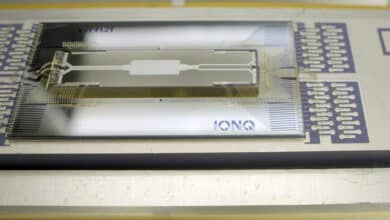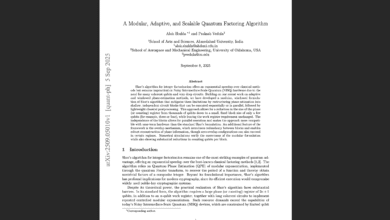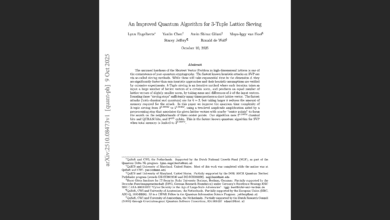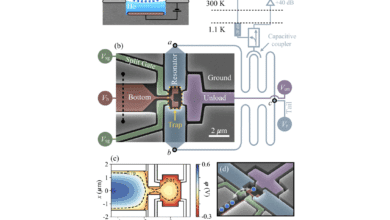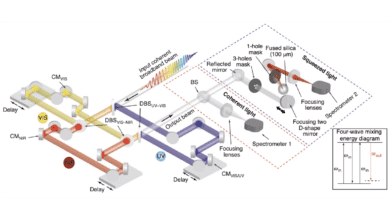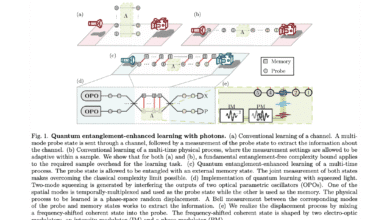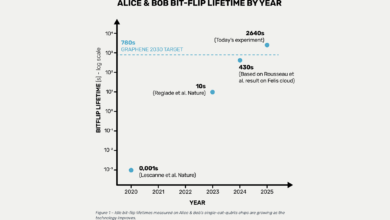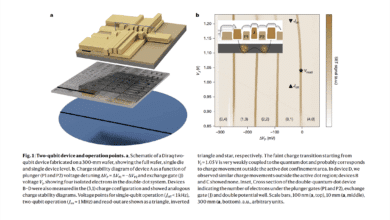Latest Quantum Research & Methods News
-
Dec- 2025 -1 DecemberResearch News
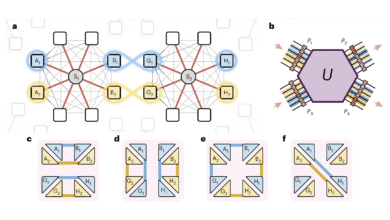
Linking Two Quantum Networks
A new paper in Nature Photonics by Natalia Herrera Valencia et al. (2025) reports a prototype quantum network that connects two previously separate networks into a single eight-user system. In practical terms, the team from Heriot-Watt University demonstrated a reconfigurable quantum photonic network that can route entanglement to different users on demand and even “teleport” entanglement across network boundaries. This…
Read More » -
Nov- 2025 -13 NovemberIndustry & Ecosystem News

IBM Unveils “Nighthawk” and “Loon” Quantum Chips: Milestones Toward Quantum Advantage and Fault Tolerance
IBM has announced two significant advances in quantum computing as part of its updated roadmap on November 12, 2025. At the annual Quantum Developer Conference, the company introduced IBM Quantum Nighthawk and IBM Quantum Loon – two new processors that mark major steps toward achieving practical quantum advantage by 2026 and fault-tolerant quantum computing by 2029. The first is a…
Read More » -
11 NovemberResearch News

Harvard’s 448-Atom Quantum Computer Achieves Fault-Tolerant Milestone
A Harvard-led team unveiled a record-breaking neutral-atom quantum processor that for the first time integrates all core elements of scalable, error-corrected quantum computation into a single system. Quantum computers promise exponential processing power by encoding information in qubits – quantum bits – that can exist in superposition and become entangled. But qubits are notoriously fragile, easily losing their quantum state…
Read More » -
6 NovemberResearch News
Princeton Builds Qubit 3× Longer-Lived (1 ms Coherence)
A team at Princeton University has achieved a major leap in quantum hardware: a superconducting qubit that retains its quantum state for over 1 millisecond - roughly three times longer than the previous record. This coherence time of 1 ms, reported in Nature on November 5, marks the largest single improvement in qubit lifetime in over a decade. Longer-lived qubits directly translate…
Read More » -
Oct- 2025 -31 OctoberResearch News
Quantum Sensor Endures Extreme Pressures (240 GPa)
Quantum sensing is conquering extreme frontiers. Scientists have built a diamond-based quantum sensor that operates stably at pressures up to 240 GPa - about 2.4 million atmospheres, equivalent to the pressure in Earth’s core. This feat, reported October 30 by a team led by Qingtao Hao and colleagues, shatters previous records (which were on the order of 100-140 GPa) for quantum measurements…
Read More » -
25 OctoberResearch News
Quantum Key Distribution (QKD) Smashes Distance Record
NVIDIA is forging a tighter link between quantum and classical supercomputers. At its GTC Washington, D.C. event on October 28, NVIDIA unveiled NVQLink, a new high-speed interconnect and open architecture that couples quantum processors (QPUs) directly with GPU-accelerated supercomputers. The system supports a broad ecosystem - connecting 17 different quantum hardware platforms (from startups like IonQ, Pasqal, Quantinuum, Rigetti and…
Read More » -
22 OctoberResearch News
Google Announces “Verifiable Quantum Advantage” on Willow Quantum Chip
Google’s 105-qubit Willow quantum processor was used to demonstrate a “verifiable quantum advantage,” performing certain calculations much faster than a classical supercomputer could. Google’s Quantum AI team announced that Willow executed a new algorithm called “Quantum Echoes,” which involves measuring subtle quantum “echo” signals in a chaotic system (technically known as out-of-time-order correlators). This marked the first time a quantum…
Read More » -
21 OctoberResearch News
IonQ’s 99.99% Breakthrough and What It Means for Q Day
IonQ announced a new world record in quantum gate performance: >99.99% two‑qubit fidelity demonstrated on trapped‑ion hardware without ground‑state cooling. IonQ says the result comes from a new “smooth gate” technique developed by the Oxford Ionics team (now part of IonQ) and claims it will underpin 256‑qubit prototype systems in 2026 and a long‑term roadmap to millions of qubits by…
Read More » -
12 OctoberResearch News
Unpacking the “Modular Quantum Factoring” Hype: Why RSA Isn’t Dead Yet
I’ve been inundated with messages asking about a recent paper titled “A Modular, Adaptive, and Scalable Quantum Factoring Algorithm.” On social media and even some press articles, this paper has been touted as a breakthrough - with claims that it dramatically reduces qubit requirements and possibly signals an imminent threat to RSA encryption. Understandably, CISOs in my network are alarmed,…
Read More » -
10 OctoberResearch News
Quantum Sieving Breakthrough: Lattice Attack Exponent Slashed by 8%
A Dutch-led research team has achieved a significant breakthrough in quantum cryptanalysis of lattices. In an October 2025 paper "An Improved Quantum Algorithm for 3-Tuple Lattice Sieving" on arXiv, the authors report reducing the time complexity exponent for a key lattice attack from 0.3098 to 0.2846. In practical terms, this ~8% drop in the exponent translates to a theoretical speedup…
Read More » -
4 OctoberResearch News
Above 1 K Qubits
A new peer-reviewed study in Physical Review X reports a breakthrough in quantum computing hardware: researchers at the startup EeroQ have successfully trapped and controlled individual qubits at 1.1 kelvin - over 100 times hotter than the ~10 millikelvin temperatures used by today’s quantum processors. The paper, titled “Sensing and Control of Single Trapped Electrons Above 1 Kelvin,” was published on October 2, 2025. In…
Read More » -
4 OctoberResearch News
Capturing Uncertainty
A team of researchers led by Dr. Mohammed Th. Hassan at the University of Arizona has published a new paper titled “Attosecond quantum uncertainty dynamics and ultrafast squeezed light for quantum communication” (Sennary et al., 2025) in Light: Science & Applications. This study reports the first-ever direct capture and control of quantum uncertainty in real time using ultrafast “squeezed” light…
Read More » -
Sep- 2025 -26 SeptemberResearch News
Researchers Demonstrate Quantum Entanglement Can Slash a 20-Million-Year Learning Task Down to Minutes
A team led by the Technical University of Denmark (DTU) has published a milestone paper, “Quantum learning advantage on a scalable photonic platform,” in Science (Sept 25, 2025). Preprint arXiv:2502.07770. The work is the first proven quantum advantage using a photonic system, showing that an optical quantum setup can learn the behavior of a complex system exponentially faster than any…
Read More » -
26 SeptemberResearch News
Alice & Bob’s One-Hour “Cat Qubit” Breakthrough – What It Means for Quantum Computing and Q-Day
A new experiment from quantum computing startup Alice & Bob has set a remarkable milestone. In a recent blog post titled”Just Out of the Lab: A Cat Qubit That Jumps Every Hour,” the company revealed that one of its qubits - a special”cat qubit” - remained stable against bit-flip errors for about one hour. This is a record for superconducting…
Read More » -
25 SeptemberResearch News
Silicon Spin Qubits Achieve >99% Fidelity in 300‑mm Foundry Fabrication
The race toward large-scale quantum computing just hit a significant milestone. In a new Nature paper “Industry‑compatible silicon spin‑qubit unit cells exceeding 99% fidelity” (open access) a team from Diraq and imec reported that they achieved better than 99% gate fidelity for silicon spin qubits manufactured using standard 300 mm semiconductor fabrication processes. Crucially, this wasn’t a one-off demonstration: four separate…
Read More »
